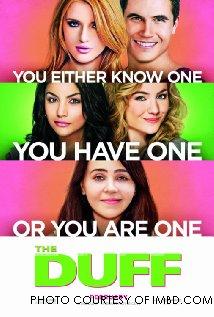Robbie Amell, Mae Whitman and Bella Thorne, stars from the CBS film, The DUFF, sat down for a conference call with several high school journalists across the country. Questions tended to revolve around how accurately the movie portrays high school, as that’s the biggest challenge high school movies face.
Q: How did you mentally prepare for the role?
Thorne: I just had to remember high school, and how painful it was. I think for me… I was bullied in school and so I just kind of had to go back to that unpleasant memory of how tough high school can be. And then.. convey that.
Q: So, what did you use as inspiration for your different roles in the movie?
Whitman: My life. Mae Whitman here. I used my own high school experience and it was a tough one, my own high school experience. So I just kind of went back there and relive those sad memories.
Q: Mae and Robbie, did any of you experience this kind of social phenomena when you were in high school?
Whitman: I did. I definitely was bullied and called weird names, and stuff. And that’s a big reason why I was drawn to doing this movie to sort of communicate that. A lot of people go through this and that I certainly had. So I wanted to you know use my experience to sort of maybe make people feel less alone, or like you know this is a real infrastructure at all because it’s definitely not. It gets better after school. It definitely gets better.
Q: What about the idea of Duff and that kind of high school set the interest in doing for trying these different characters?
Whitman: For me, I like the idea of sort of breaking down the need for people to compare, and judge, and keep people down, and keep people in specific boxes. I think it’s really like limiting for everyone involved and it’s just not real. And it’s hard when you don’t really have any perspective, especially when you’re in school. And everything feels so present and so there, and it really hurts.
Amell: And it was super refreshing to read you know a teen comedy script that kind of grasps what it’s like to be in high school. You know everybody is trying to find their way and figure out who they are. And that you know dealing with their own issues and issues with friends, and… other people.
Q: How do you guys feel about being casted as stereotypes in high school?
Thorne: I think that this movie didn’t have the understanding of the stereotypes, maybe it would feel a little more upsetting but I think the whole point of this movie is sort of exposing stereotypes and how thin they are, and how not real they are, and how sort of silly they are, and sort of providing a perspective.
Amell: Very John Hughes in Breakfast Club. At the beginning, everybody has got their stereotype and then you get to watch them go on this journey, and it’s fun to see what they you know what they turn into at the end of the movie.
Thorne: It’s a statement about how like layered and complex every single person is regardless of the labels that people try to put on them.
Q: Do you guys believe that Duff is real to high schools today?
I think that’s what we really wanted to convey with this movie was how silly it is to think that anyone deserves to be put in a box that is some other makes up for their own weird sad reasons.I mean it just doesn’t, none of that stuff exists. None of the mean, crazy stuff that people get called, or the labels, or the boxes that people get put in exists like you’re the only one who can say who you are and be who you are. Nobody else know what they’re talking about.
And thus those are the opinions that these actors are trying to express in this movie. When it comes to its high school accuracy, these are all actors who have either just finished with high school or are still in high school. They have faced the same problems their characters have faced and take this as an opportunity to express to other teenagers that high school doesn’t last forever.

Leave a Reply